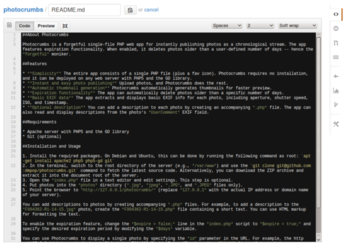Using Bitbucket and GitHub for Note-Taking as Writing Tools

Productivity Sauce
Both Bitbucket and GitHub feature built-in editors which can be used for creating and editing files. This feature can come in handy when you need to quickly jot down a note, draft an article, or save a text snippet. GitHub's editor is particularly suitable for writing and note-taking, as it supports soft wrap and the zen mode which provides a distraction-free writing environment. Bitbucket's editor doesn't offer any of these nice touches, but the service lets you maintain private repositories free of charge. So Bitbucket makes a better choice if you want to keep your scribbles private without spending money.
Using GitHub's and Bitbucket's built-in editors for note-taking is rather straightforward. To keep things tidy, you might want to set up a separate repository for your scribbles. Once you've done that, you can create a new text file and open it for editing. To do this on GitHub, click on the dedicated button which opens an empty file in the editor (see the Creating files on GitHub article for further info). You can then edit the file to your heart's content. You can edit existing files, too. In the repository, click on the file you want to edit, then press theEdit button. Working with files on Bitbucket is equally easy. Press the New file button to create a new file and open it in the editor. To edit an existing file, click on it, then press the Edit button.
comments powered by DisqusSubscribe to our Linux Newsletters
Find Linux and Open Source Jobs
Subscribe to our ADMIN Newsletters
Support Our Work
Linux Magazine content is made possible with support from readers like you. Please consider contributing when you’ve found an article to be beneficial.

News
-
Kernel 7.0 Now in Testing
Linus Torvalds has announced the first Release Candidate (RC) for the 7.x kernel is available for those who want to test it.
-
Introducing matrixOS, an Immutable Gentoo-Based Linux Distro
It was only a matter of time before a developer decided one of the most challenging Linux distributions needed to be immutable.
-
Chaos Comes to KDE in KaOS
KaOS devs are making a major change to the distribution, and it all comes down to one system.
-
New Linux Botnet Discovered
The SSHStalker botnet uses IRC C2 to control systems via legacy Linux kernel exploits.
-
The Next Linux Kernel Turns 7.0
Linus Torvalds has announced that after Linux kernel 6.19, we'll finally reach the 7.0 iteration stage.
-
Linux From Scratch Drops SysVinit Support
LFS will no longer support SysVinit.
-
LibreOffice 26.2 Now Available
With new features, improvements, and bug fixes, LibreOffice 26.2 delivers a modern, polished office suite without compromise.
-
Linux Kernel Project Releases Project Continuity Document
What happens to Linux when there's no Linus? It's a question many of us have asked over the years, and it seems it's also on the minds of the Linux kernel project.
-
Mecha Systems Introduces Linux Handheld
Mecha Systems has revealed its Mecha Comet, a new handheld computer powered by – you guessed it – Linux.
-
MX Linux 25.1 Features Dual Init System ISO
The latest release of MX Linux caters to lovers of two different init systems and even offers instructions on how to transition.

